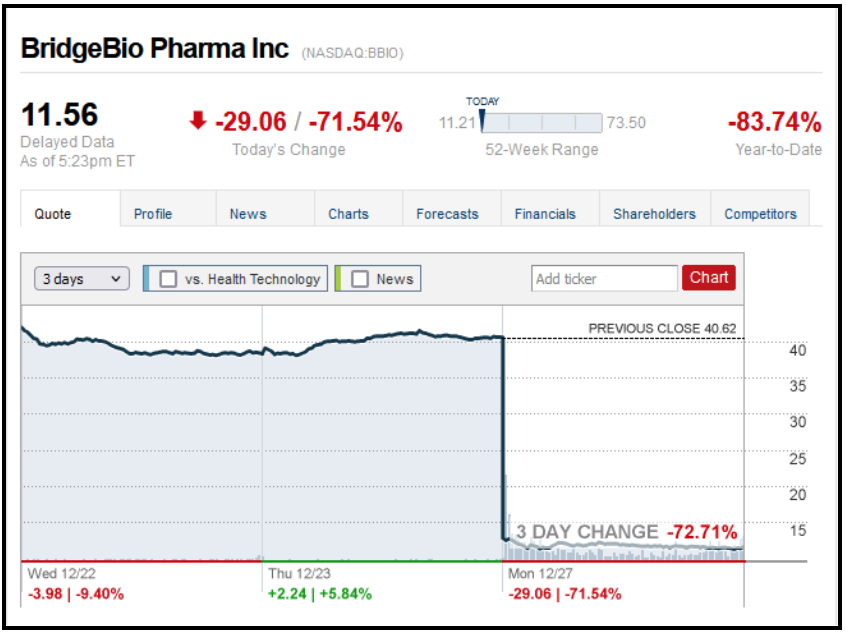BridgeBio Pharma Heads to the ICU

KABOOM!
Looks like the board for BridgeBio Pharma Inc. (BBIO) is going to need a truckload of aspirin after the pharmaceutical company’s stock was seriously injured on Monday. The drug-maker experienced over a 70% drop in the price of their shares after announcing that the phase 3 trial of their premier drug, Acoramidis, failed to meet its endpoint at month 12 of clinical trials. This is only the latest hit to BBIO’s stock price as the company is down 82% YTD.
- The CEO of BBIO is pretty baffled at missing these targets, especially when considering that placebo groups for Acoramidis experienced a drop in symptomatic transthyretin (TTR) effects 70% lower than the group taking the drug.
- The company is now changing its outlook towards Acoramidis’ 30 month endpoint, hoping it has the expected effects on all-cause mortality and cardiovascular hospitalizations. In the meantime they have multiple projects in the pipeline to address various Mendelian genetic conditions. Even with that in mind however, this kind of setback for their premier drug is bound to create some serious headaches.

As mentioned previously, it appears that these kinds of drops are somewhat of a chronic condition for BBIO who certainly have had a bad year on the market. They already have a serious competitor to their headline drug in Vyndamax (made by Pfizer no less) which achieved FDA approval in 2019 and has already seen serious sales. Sure, there may be hope left in BBIO’s ability to find treatment for Mendelian conditions, but their hope that Acoramidis will prove itself at the 30-month mark seems like wishful thinking at this point. If one were to have a lot of faith in the drugmaker, now could be the best time to buy but the future of the stock is not looking particularly healthy.
Back in the Black – Mastercard
says Holiday Sales were up this
year

While sales for Black Friday and Cyber Monday fell short of analyst optimism, a recent report released by Mastercard provides numbers that indicate holiday spending actually ended up 8.5% higher than the same period in 2020. Sure this growth was 0.3% lower than Mastercard’s own prediction of an 8.8% increase, but it still kept the spending season well in the black, even if analysts had been seeing red just a month prior.
- Mastercard’s report not only assuages the gloomy sentiment around retail seen in November, but also informs what retail sectors experienced the highest growth in sales. Leaders included apparel and jewelry, which experienced +47.3% and +32.0% growth over the same period in 2020 respectively.
- Black Friday actually did kick off this holiday surge in sales, as it still claimed the throne of the highest spending day during the holiday season. Thanksgiving weekend drove US retail sales up 14.1% YoY, while e-commerce made up 20.9% of total retail sales.

This report certainly seems encouraging regarding the health of spending and consumer confidence going into the new year. Naturally, it’s important to remember that spending will usually be going up during the holiday season (since the elves started complaining about their wages too), but there were concerns that the holiday season could have been a bust thanks to inflation and pandemic woes. The numbers aren’t going to end here either as a record number of gift card purchases are likely to keep sales numbers afloat through the end of the year (sales made using gift cards don’t count until the card has been redeemed). Of course it’s important to leave expectations slightly tempered as omicron still rages across the country, and the effects of the Fed’s taper has yet to be seen on inflation.
Omicron Now Part of Cancel
Culture

Shares of airline and cruise line stocks took another hit Monday after continued cancellations of flights and trips due to the new ‘vid variant, Omicron. More than 3,000 flights were canceled over the Christmas holiday weekend, while Monday saw another 800+. Severe weather was partially to blame for the cancellations, but the majority were due to staff shortages caused by Omicron. Maddie King, a spokesperson for United Airlines said, “This was unexpected,” when referencing Omicron’s effect on staffing over the holiday weekend. And this, ladies and gentlemen, is why the airlines need to continually be bailed out by the government.
- American (AAL), United (UAL), Delta (DAL), Southwest (LUV), Spirit (SAVE), and JetBlue (JBLU) finished Monday’s trading session down between .26%-1.49%.
- Norwegian Cruise Lines (NCLH), Royal Caribbean (RCL), and Carnival Corp. (CCL), otherwise known as floating Covid prisons, closed Monday down between 1.18%-2.55%.
- On Saturday and Sunday alone, more than 5,500 flights had to be canceled worldwide. I think we all can agree that the worst part of this is being stuck at home with our families.

Airlines have been a mixed bag in 2021, with AAL leading the pack up 15.22% YTD, while LUV has been the weakest at -10.51% on the year. There’s a few ways you can play the sector as a whole. You can take a look at JETS, which is the U.S. Global Airlines ETF giving you exposure to the sector (and to covid) with limited single stock risk. For those with a larger appetite for risk, you can play a pairs trade by going short the strongest of the group and going long the weakest with price reversion being the goal. Keep the travel sector stocks on your watchlist and hopefully you didn’t have to pull a John Candy to get home for the holidays.